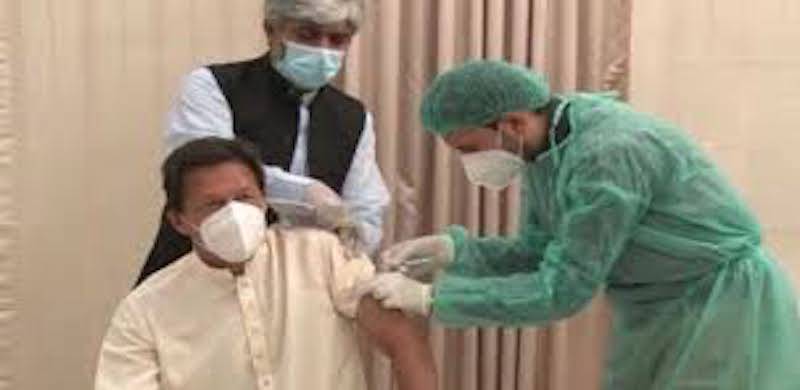
When the news of Prime Minister Imran Khan being diagnosed with Covid-19 a mere two days after receiving his first dose of the Covid vaccine broke, anti vaxxers grasped the moment. The misleading claims we heard (and have been told about Covid-19 vaccine) are nearly similar to lies Pakistanis have been told about polio, and other vaccines: that vaccines haven’t undergone adequate human testing; the pharmaceutical companies who produce them are profit hungry and that the ingredients used in the vaccine are incredibly dangerous and ineffective. The public well-being of our society is now dependant on how effectively public health department and media counters the misinformation on vaccines.
And to effectively do that, amongst other strategies, the myth of Imran Khan’s Covid diagnosis needs to burst. In simplest terms, Prime Minister was exposed to Covid before his vaccination. As the head of National Coordination committee on Coronavirus, Asad Umar mentioned, “The symptoms (of coronavirus) take a few days before manifesting. Hence, it is certain that [the] PM had been infected PRIOR to vaccination. So please do vaccinate”. If Asad Umar’s statement is inadequate, then scientific and medical consensus, underpinned by the globe’s sharpest minds, informs us that it takes two doses of the Covid vaccine to develop immunity and anti-bodies to counter the infection. Prime Minister Imran Khan had received just the one dose, and he was already infected with the virus.
Now, enough of vaccine science and back to misinformation.
Pakistan’s anti-vaccine activists enjoy a scale of outreach and prominence, far greater than anytime in our history due to social media dynamics. Grassroots networked activism is driving anti-vaccine COVID-19 propaganda. We have witnessed an overwhelming rise in tweets, Whatsapp conspiracy theories, posts diminishing trust in vaccine rollouts. The ability to return to normalcy depends on government and public health authorities’ success in combatting this misinformation.
Fighting back and deconstructing vaccine misinformation requires an understanding of the channels by which the information spreads. Emerging false narratives, around vaccines, have already occupied mass audience because of social-media sharing. Tech platforms, such as Facebook and Twitter have committed to tackling and taking down misinformation as Covid-19 spread around the world.
However, detecting false information and narratives is the hardest on Whatsapp, which has become the primary pathway of anti-vaccine propaganda. While social media disclaimers and fact checks are helpful, they are unable to address a basic lack of trust in government institutions and western science. The problem is amplified in Pakistan because vaccine hesitancy stems from a deeply embedded anti science culture.
The real challenge for Pakistani government lies in countering anti-vaccine misinformation with accurate information that can inculcate confidence in vaccine’s effectiveness. The first step, along the way, needs to be government officials wearing masks during gatherings and meetings. Displaying trust in science and medical guidance, at the highest levels of government is cornerstone of effective signalling in matters of public health. People need to hear and see leaders believe in science, not crude forms of bravery. Leaders, who enjoy a cult of personality and mass following, like the Prime Minister, did no good by refusing to wear masks. (This was championed by Shahbaz Gill as bravery). The same goes for opposition leaders like Maryam Nawaz. Hence, public display of vaccination by President and Prime Minister will go a long way in securing Public’s confidence.
Second, the government must partner with religious and civil society groups that are trusted by communities, giving them resources to communicate effectively. The people who must be part of the messaging on vaccination need to be those who represent communities most distrustful of it, or have sway with the masses. Conspiracy theories usually spread in trust deficit environments, especially if people within those communities don’t trust the government because of irrational tendencies. This is why it is quintessential to partner with religious scholars and Ulema to deliver Fatwas on the importance of getting vaccinated. Friday sermons and Khutbas, declaring vaccine important, should be utilised to breed its acceptance among the public.
Lastly, the power to escalate narrative and false information resides with all of us. It is, hence, crucial to be aware of what we share, how we share and when we share it. We need to correct the misleading stories and exaggerated versions of the vaccine’s side effects. This is applicable to family settings, friends’ groups and elsewhere. Debating vaccine’s side effects and efficacy cannot be conflated with paying heed to downright ridiculous conspiracy theories. The onus is on all of us, to fight the anti-vaccine wave. For allowing public trust to erode in vaccines will have serious consequences for all of us.
